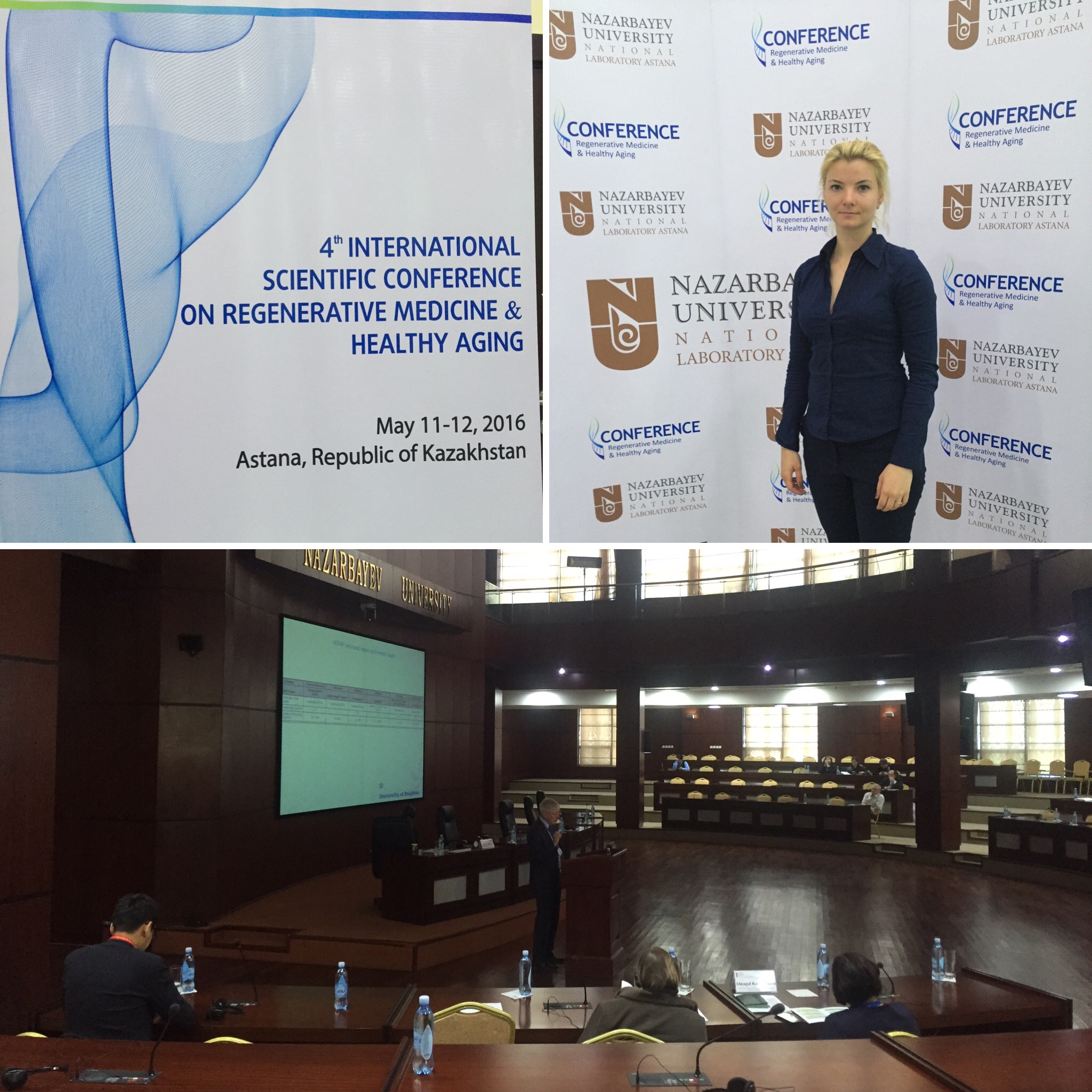May 17th, 2016
On May, 11-12th I worked as a simultaneous English-Russian interpreter in Astana, at the Nazarbayev University at the 4th International Scientific Conference on regenerative medicine and healthy aging.

English translator at Nazarbayev University
The conference was really multidisciplenary as it touched upon such issues as risk factors of the coronary heart disease, rodon-induced lung cancer, treatment of end-stage liver desease as well as targeted sequencing and carbon wound dressings. As it happens quite often at medical conferences, the speaker do not provide organizers with their presentations ahead of time due to intellectual property reasons, so interpreters cannot prepare for the conference which make the work so much more difficult. The topics were also very varied: they ranged frm cardiology to oncology, from gerontology to neurology which means as a translator you have to be prepared for everythign and anything.
Finally two challenging but interesting days are over and among other things that I learnt at the conference I now know there is an app for mobile phones that can track wrinkles on one’s face 🙂
Tags: English-Russian simultaneous translation, interpreter Nazarbayev University, medical translation astana
Posted in About Kazakhstan, Astana, Foreigners in Kazakhstan, Interpreter Astana, medical translation, News, Simultaneous translation, translation services, translation Астана
» No Comments
April 10th, 2015
On April, 9th 2015 I worked as a simultaneous Russian-English translator at the I Eurasian Congress of Gerontologists.
The Congress gathered scientists from Kazakhstan, Russia, Belarus, Ukraine, USA, Japan with the participation of the State Secretary of Kazakhstan and the Minister of healthcare and social protection of Kazakhstan.

Reports were delivered on topics like: “Molecular Aspects of Peptide Regulation of Ageing”, “Heart tissue engineering”, “Geriatric Frailty and Its Prevention as a Concept of Modern Gerontology”, “Treatment of Comorbidities Improves Overall Survival and Quality of Life of Brain Tumor Patients” and many others.
It was the first time that I had a chance to translate this area of medicine but its terminology is not that specific; it has a lot of terms from a general medicine, such as cardio-vascular deceases, diabetes, malignant tumor, mortality, healthy life style, etc.

I have learnt a lot of interesting things: for example, it is not a good idea to switch on bright light at night as it reduces the level of melatonin being produced in out bodies which protects us from ageing. Or that there is such thing as light pollution: our cities are never in complete darkness, they are highly illuminated which is again not good for our bodies that should be experiencing darkness at night and light during day time.
In other words, the Congress was very informative and fuitful, scientists have shared their achievements and new ideas with each other. Now thanks to my work I know a little bit more about how to live a long and healthy life and, as Ashley Montagu said, better die young as late as possible.
Tags: medical translation astana, medical translator astana, Russian-English simultaneous translator, simultaneous interpreter astana, Translator Astana
Posted in Astana, Foreigners in Kazakhstan, medical translation, News, Sessions, Simultaneous translation, translation services, Астана
Comments Off on Russian-English translation at the I Eurasian Congress of Gerontologists.
October 11th, 2014
On October, 2-3rd I translated from Russian to English and English to Russian at the second congress of traumatologists-orthopaedists of the Republic of Kazakhstan.

My task was quite challenging as medical translation should always be very specific, topics like hip replacement, short legs, different types of prothesis, congenital dislocation of hip, arthroplasty were discussed in great details.
The night before translation was very intense I had to read up on traumas quite a bit both in Russian and English. I didn’t become a doctor over a night of course, but I read enough to differ between talus and patella, shin bone and spoke bone, lavage and sanitation.
During the forum lectures were given by the guests from Germany, the UK and Luthuania. Questions and answers session followed each lecture. Participants were eager to know why cementless prothesis is better than cement one, why metal leg of prothesis has a better effect than the ceramics one, in which cases fast track surgery can be used, etc.
I definitely learned a lot about hip replacement and its prevention. I have prepared my own glossary of terms related to traumatology and orthopaedics, so hopefully next time it will be easier!
Tags: English-Russian simultaneous translation, forum astana, medical congress astana, medical translation
Posted in About Kazakhstan, Astana, Foreigners in Kazakhstan, medical translation, Simultaneous translation, translation services
Comments Off on Simultaneous Translation at the congress of traumatologists and orthopaedists
